
Myrrhis odorata, with common names cicely, sweet cicely, myrrh, garden myrrh, and sweet chervil, is a herbaceous perennial plant belonging to the celery family Apiaceae. It is the only species in the genus Myrrhis.

Dipteryx odorata is a species of flowering tree in the pea family, Fabaceae. The tree is native to Northern South America and is semi-deciduous. Its seeds are known as tonka beans. They are black and wrinkled and have a smooth, brown interior. They have a strong fragrance similar to sweet woodruff due to their high content of coumarin.
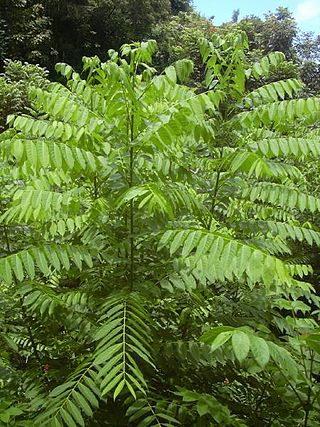
Cedrela odorata, commonly known as Spanish cedar, Cuban cedar, or cedro in Spanish, is a commercially important species of tree in the chinaberry family, Meliaceae native to the Neotropics.
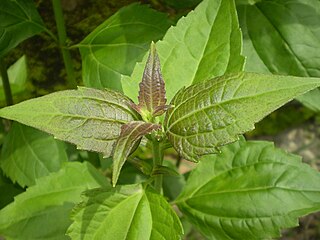
Chromolaena odorata is a tropical and subtropical species of flowering shrub in the family Asteraceae. It is native to the Americas, from Florida and Texas in the United States south through Mexico and the Caribbean to South America. It has been introduced to tropical Asia, West Africa, and parts of Australia.

Tephrosia is a genus of flowering plants in the family Fabaceae. It is widespread in both the Eastern and Western Hemisphere, where it is found in tropical and warm-temperate regions.
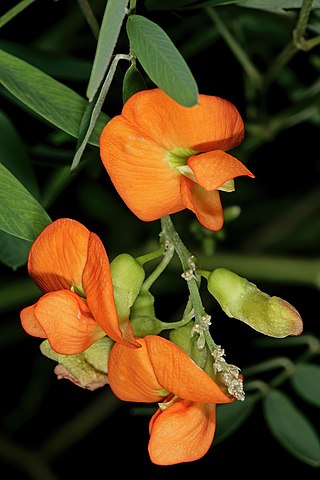
Tephrosia pondoensis is a species of plant in the family Fabaceae. It is found only in the Cape Provinces of South Africa, where it is protected under the National Forest Act of 1998. The pondo poison pea is threatened by habitat loss.
Tephrosia socotrana is a species of plant in the family Fabaceae.

Aglaia odorata is a species of plant in the family Meliaceae. It is found in Cambodia, China, Indonesia, Myanmar, Taiwan, Thailand, Vietnam, and possibly Laos.
Henriettea odorata is a species of plant in the family Melastomataceae. It is native northern South America, from Ecuador to Nicaragua. Its natural habitat is subtropical or tropical moist montane forests.
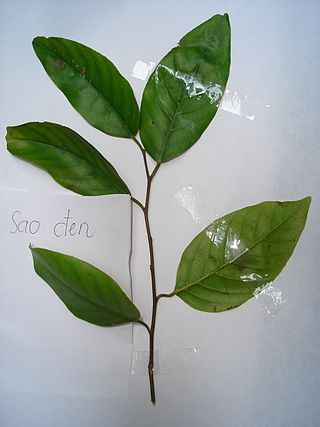
Hopea odorata is a species of tree in the plant family Dipterocarpaceae. It is found in Bangladesh, Cambodia, India, Laos, Malaysia, Singapore, Myanmar, Thailand, and Vietnam.
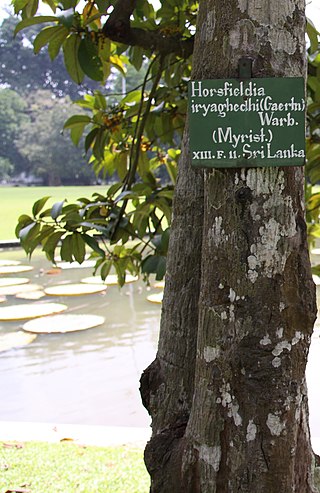
Horsfieldia iryaghedhi is a species of plant in the family Myristicaceae. It is endemic to Sri Lanka.

Mangifera odorata, commonly known as kwini, huani, or Saipan mango, is a species of plant with edible fruit in the family Anacardiaceae. It is similar to the related mango but is characterized by a strong turpentine-like smell on the skin and fibrous flesh. It is native to tropical Southeast Asia, but its exact original native range is unknown because it is only known from cultivated specimens and is believed to be a hybrid of Mangifera indica and Mangifera foetida. It is grown throughout Southeast Asia, from peninsular Thailand, to Malaysia, Indonesia and the southern Philippines. It has also been occasionally cultivated in southern Vietnam and the Marianas Islands.

Nymphaea odorata, also known as the American white waterlily, fragrant water-lily, beaver root, fragrant white water lily, white water lily, sweet-scented white water lily, and sweet-scented water lily, is an aquatic plant belonging to the genus Nymphaea. It can commonly be found in shallow lakes, ponds, and permanent slow moving waters throughout North America where it ranges from Central America to northern Canada. It is also reported from Brazil and Guyana.

Tephrosia virginiana, also known as goat-rue, goat's rue, catgut, rabbit pea, Virginia tephrosia, hoary pea, and devil's shoestring is a perennial dicot in family Fabaceae. The plant is native to central and eastern North America.
Odoratus is a Latin adjective meaning "fragrant, perfumed", and may refer to:

Tephrosia rosea, commonly known as Flinders River poison, is a plant species, endemic to northern Australia. It is a shrub with an erect or sprawling habit, growing to between 0.2 and 2 metres high. Pink to purple flowers are produced throughout the year in the species' native range.

Tephrosia vogelii, the Vogel's tephrosia, fish-poison-bean or Vogel tephrosia (English), tefrósia (Portuguese) or barbasco guineano (Spanish), is a flowering plant species in the genus Tephrosia.

Tephrosia apollinea is a legume species, native to southwest Asia and northeast Africa.
Vatica odorata is a tree in the family Dipterocarpaceae. The specific epithet odorata means 'scented', referring to the flowers.

Erblichia odorata is the sole member of the monotypic genus Erblichia. It is colloquially known as Butterfly tree or Flor de Mayo.
















